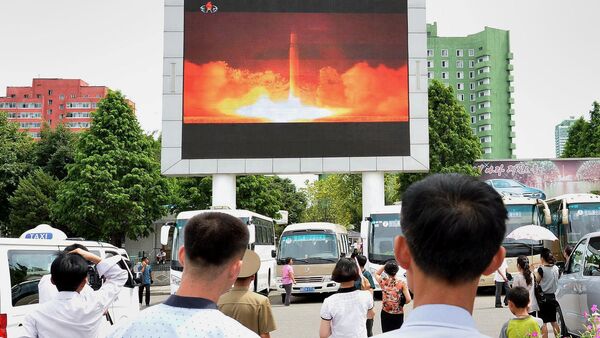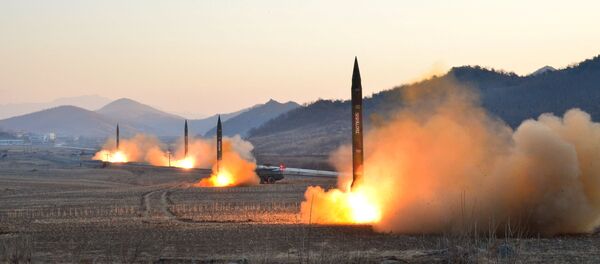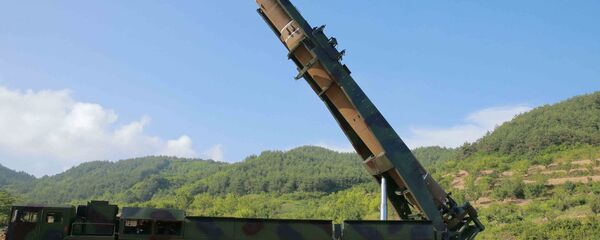According to KCNA, the ICBM soared for 47 minutes, 12 seconds and struck its intended area.
The news agency added that the missile achieved an altitude of 3,724 kilometers.
US says #NorthKorea tested another missile — and it looks like an #ICBM that could reach #NewYork and DC https://t.co/agggfsFtnK pic.twitter.com/9OUYO3449B
— Politics Newz (@PolticsNewz) 28 июля 2017 г.
In terms of the missile's distance, North Korea's estimates line up with the Pentagon's calculations, which claimed that the missile traversed approximately 1,000 kilometers before landing in the Sea of Japan.
While the Pentagon and Pyongyang claim the missile was of the "intercontinental" variety, the Russian Ministry of Defense said the missile was a medium-range ballistic missile "based on its technical characteristics."
#Pyongyang watching the #NorthKorea Hwasong-14 ICBM 2nd test launch. pic.twitter.com/cSYbfPNVpf
— Aldin 🇧🇦 (@aldin_ww) 29 июля 2017 г.
In an interview with Sputnik, Igor Korotchenko, a Russian military expert and editor-in-chief of the Natsionalnaya Oborona (National Defense) magazine, said that Washington's stance on North Korea is forcing the country to facilitate the development of nuclear weapons.
"It is Washington which is responsible for the sharp acceleration of Pyongyang's nuclear missile program. Washington's provocations and promises to start a war against North Korea, as well as its permanent drills involving South Korea push North Korean leader Kim Jong-Un that North Korea to allocate more money for the creation of [nuclear] potential capable of protecting the country from American threats," Korotchenko said.
According to him, another successful test of a ballistic missile by North Korea "shows that this is how Pyongyang reacts to US threats and sanctions."
"The percentage of North Korea's successful launches is growing amid Pyongyang's efforts to create means capable of ensuring the sovereignty of North Korea," Korotchenko said referring to nuclear missiles.
According to him, North Korea is dealing with the "miniaturization" of the nuclear charge so that it can be installed on warheads of intermediate and intercontinental ballistic missiles.
"If this problem is resolved, we will [be able to] safely say that Pyongyang had actually worked out the delivery means," Korotchenko pointed out.
He added that all this once again underscores the necessity of developing a diplomatic dialogue between the United States and North Korea.
New Video Footage Shows Powerful #NorthKorea ICBM That Can Hit The US https://t.co/clTybqS6Tv pic.twitter.com/i7clCGpogb
— Pavel Кulyuk (@Paveluljuk) 30 июля 2017 г.
On July 4, North Korea announced it had successfully launched its first intercontinental ballistic missile, saying it traveled 580 miles and reached an altitude of 1,740 miles during its 39-minute flight before accurately hitting a targeted area in the Sea of Japan.
Following the launch, the Russian Defense Ministry disputed Pyongyang's claim, saying the missile's flight parameters indicated it reached an altitude of 535 kilometers (332 miles) and traveled 510 kilometers before falling in the central Sea of Japan.
However, US officials claimed that Pyongyang had successfully launched an ICBM for the first time.






